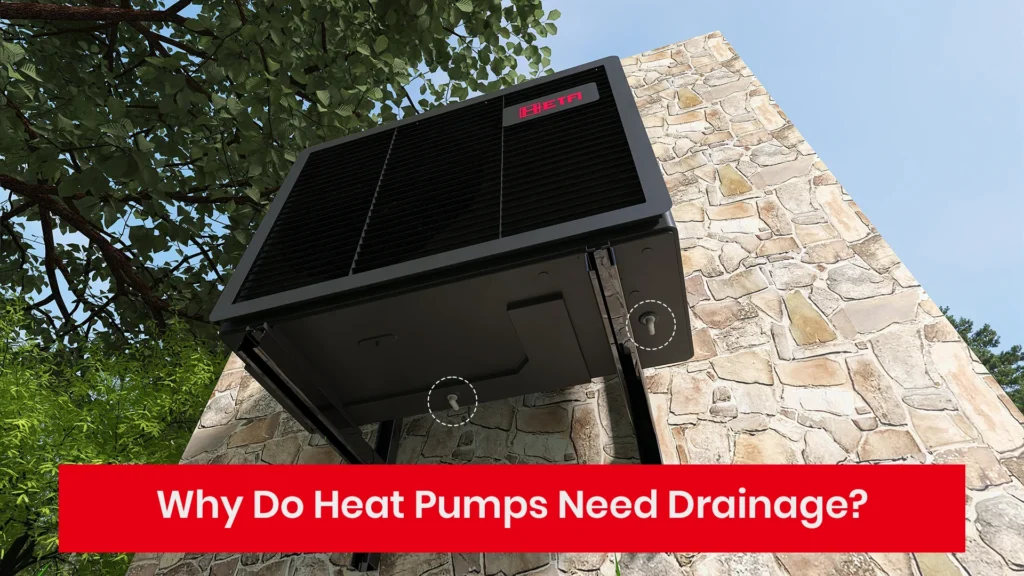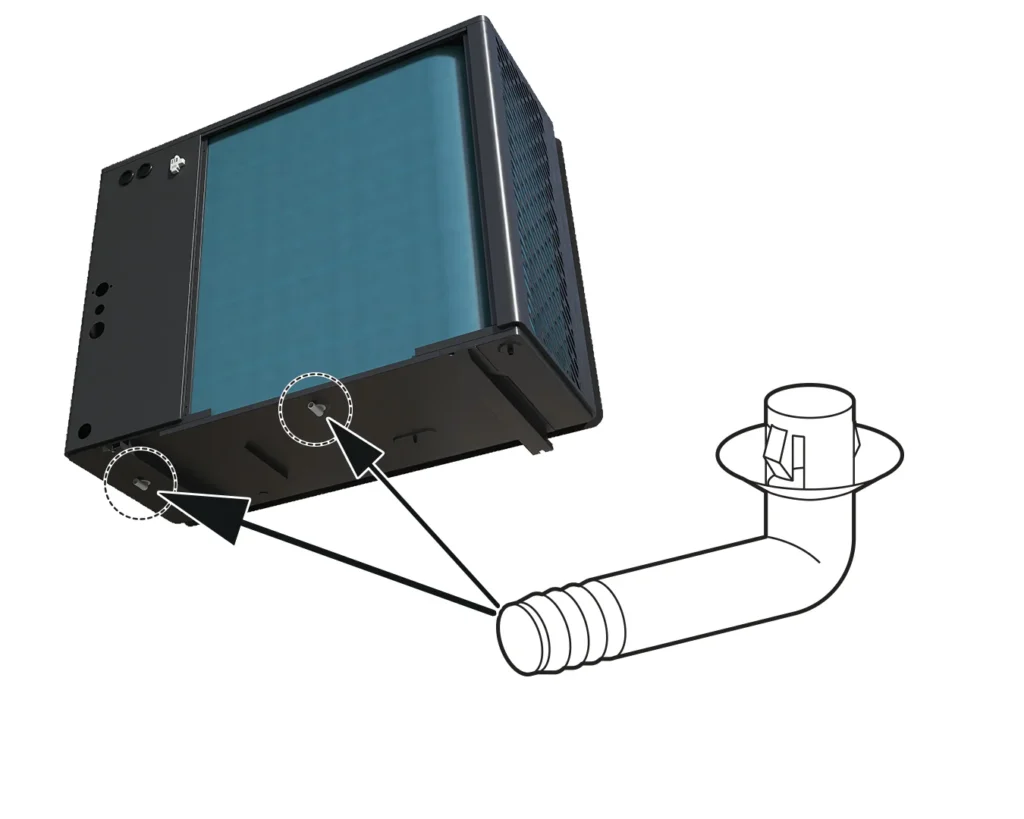
Table of Contents
Heat pumps are widely used for heating and hot water supply, especially in cold climates. However, one often overlooked but critical aspect of their operation is drainage. Without a well-designed drainage system, a heat pump can suffer from ice buildup, reduced efficiency, and even complete failure in extreme conditions.
HETA, a leader in heat pump technology, has revolutionized drainage design with its new Heatix R290 models. In this article, we’ll explore why heat pumps need drainage, the consequences of poor drainage, and how HETA’s innovative solutions ensure reliable performance even in freezing temperatures.

The Science Behind Heat Pump Drainage
1. Why Does a Heat Pump Produce Water?
Heat pumps work by transferring heat from the air. However, during winter, when the surrounding air is cold and contains moisture, water condenses on the heat exchanger’s fins. If this water is not properly drained, it can lead to performance issues.
2. The Defrost Cycle and Water Formation
To prevent frost buildup, heat pumps periodically enter defrost mode. In this phase:
- The system briefly reverses operation, warming up the heat exchanger to melt accumulated frost.
- This creates a large amount of water, which flows down to the heat pump’s base.
- If not drained efficiently, this water can refreeze, causing severe operational issues.
3. Why Poor Drainage Leads to Ice Accumulation
When a heat pump lacks proper drainage, the defrost water can:
- Refreeze on the base, blocking airflow.
- Form thick ice layers, reducing efficiency.
- Lead to system shutdown, leaving you without heat or hot water.
This is why an advanced drainage system is essential for keeping your heat pump functioning smoothly in cold weather.
The Consequences of Poor Heat Pump Drainage
1. Reduced Heating Efficiency
If ice builds up on the base of the heat pump, it can:
- Block airflow, making heat exchange less effective.
- Increase energy consumption, as the system struggles to maintain performance.
- Lower heating capacity, making your home colder than expected.
2. Risk of Complete System Failure
In extreme cases, poor drainage can cause the heat pump to shut down entirely. This happens when:
- Ice prevents the fan from rotating properly.
- The unit enters emergency protection mode to prevent damage.
- The heat pump stops producing heat, leaving you without hot water or space heating.
3. Increased Maintenance Costs
If your heat pump’s drainage system is inadequate, you may need frequent servicing to remove ice manually. This leads to:
- Higher repair and maintenance costs.
- Inconvenience, as the system may require professional intervention.
- Shorter lifespan, since ice-related stress can damage internal components.
Clearly, good drainage is not just a convenience—it’s a necessity!
How a Well-Designed Heat Pump Drainage System Enhances Performance
1. Ensuring Continuous Heating in Winter
A properly drained heat pump ensures:
✅ No ice buildup, allowing uninterrupted operation.
✅ Consistent heating performance, even in extreme cold.
✅ Stable hot water supply, so you never run out.
2. Lower Energy Consumption
With efficient drainage, your heat pump:
🔹 Doesn’t need to work harder to compensate for ice blockages.
🔹 Operates at optimal efficiency, keeping electricity costs low.
🔹 Delivers steady performance, reducing wear and tear on components.
3. Reliable, Long-Lasting Operation
A heat pump with a well-engineered drainage system experiences:
💎 Less frequent breakdowns, reducing costly repairs.
💎 A longer lifespan, making it a wise investment for homeowners.
💎 Enhanced user experience, ensuring year-round comfort.
HETA’s Innovative Drainage Solution: A Game-Changer in Heat Pump Design
1. Intelligent Drainage Hole Placement
HETA’s Heatix R290 heat pumps are designed with precision-engineered drainage holes. Unlike conventional models, HETA has:
✔ Multiple drainage holes strategically placed throughout the chassis.
✔ High drainage efficiency around the chassis heater to prevent water buildup.
✔ A groundbreaking centralized drainage outlet for maximum effectiveness.
2. The Centralized Drainage Outlet – A Breakthrough Innovation
One of the biggest improvements in the Heatix R290 is the centralized drainage outlet, located at the rear, close to the heat exchanger—the point where most condensation occurs. This ensures:
💧 Faster water removal, reducing the risk of refreezing.
💧 Better drainage control, preventing operational disruptions.
💧 Minimal energy loss, as water is efficiently drained instead of being reheated.
3. Industry-Leading Efficiency in Extreme Cold
HETA’s Heatix R290 is one of the most efficient heat pumps available, even in sub-zero conditions. It features:
🔹 55°C hot water output in freezing weather.
🔹 A+++ energy efficiency rating, keeping energy bills low.
🔹 Less than 20% performance loss in harsh winter conditions.
These innovations make HETA the ideal choice for homeowners who demand reliability and top-tier performance.
Conclusion: Choosing a Heat Pump with Superior Drainage is a Smart Investment
A heat pump without proper drainage is a disaster waiting to happen—leading to ice buildup, energy inefficiency, and potential system failure. On the other hand, a well-designed drainage system, like that in HETA’s Heatix R290, ensures:
✅ Reliable heating and hot water in all weather conditions.
✅ Lower energy bills thanks to optimized efficiency.
✅ Minimal maintenance, reducing long-term costs.
If you want uninterrupted comfort, lower energy consumption, and a longer-lasting system, choosing a heat pump with excellent drainage is essential—and HETA is leading the way.
Upgrade to HETA’s Heatix R290 and experience the difference today!
Phone: 86-18676527809
Email: brian@hetapro.com
FAQs
1. How do I know if my heat pump has a drainage problem?
Signs of poor drainage include excessive ice buildup, reduced heating efficiency, and frequent system shutdowns in cold weather.
2. Do all heat pumps have a chassis heater to prevent freezing?
Not all models do! High-quality heat pumps, like HETA’s Heatix R290, include a chassis heater combined with an optimized drainage system to ensure smooth operation in winter.
3. How often should I check my heat pump’s drainage system?
It’s recommended to inspect and clean the drainage outlets at least once per season to prevent blockages and ensure optimal performance.
4. Why is the centralized drainage outlet in HETA’s Heatix R290 so important?
Unlike conventional designs, HETA’s centralized drainage outlet is strategically placed where most condensation occurs, allowing for faster, more efficient drainage and preventing water from refreezing.
5. Can poor drainage reduce my heat pump’s lifespan?
Yes! Ice buildup can put strain on internal components, leading to higher maintenance costs and a shorter operational lifespan.




